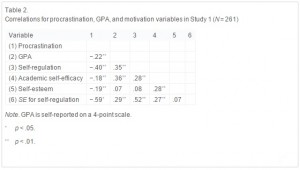If you’re an undergraduate and reading this, chances are you’re procrastinating right now. An estimated 70-95% of the undergraduate population is believed to procrastinate to at least a problematic degree. And yet, despite the massive amount of people who practice it, scientists are still debating exactly why we procrastinate.

Source: Lucy on Flickr Commons
There’s no denying that poor self-regulation (skill in remaining on task) is related. However, this article suggests another important factor: self-efficacy . The self-efficacy theory refers to our opinion about our capabilities and how it can strongly affect our performance. In regards to procrastination, we are going to focus on how well we believe we can perform academically and how well we can believe we can self-regulate. Note that we are focusing on undergraduates which have been shown to be more likely to procrastinate than adults.
Having surveyed 261 undergraduates in Western Canada, the following correlations were found:
Although they state that each of these variables are an acceptable predictor of procrastination, self-efficacy for self-regulation is clearly has the greatest correlation.
GPA and academic self-efficacy are focused on grading results which have variables that could balance out the negative effects of procrastination such as natural intellect.
The opposite of these two is self-esteem. The theory on how poor self-esteem leads to procrastination is that the subject’s motivation to avoid an assigned task is that by doing so, they have justification to why their results are bad rather than admitting to their own deficiencies. While still generally accepted, more recent research favors studying self-regulation and self-efficacy for self-regulation.
The difference in correlation between self-efficacy for self-regulation and simply self-regulation is primarily the difference between theory and practice. The survey measured self-regulation based on what techniques the subject is aware of. For example,a common one is studying in short intervals uninterrupted before taking breaks. If a student does not actually remain uninterrupted during these intervals, the technique is moot.

Source: Norah Al-Wa’al on Flickr Commons
Therefore, scientist suggest that whether one has the confidence to apply self-regulation techniques is a superior factor in determining the likeliness of procrastination. After all, it is not unlikely that students already have some knowledge on good studying techniques given that they were at least capable of entering university. What separates some from success could be if they have the strength of will to put these practices into action.
Ivan Lan

